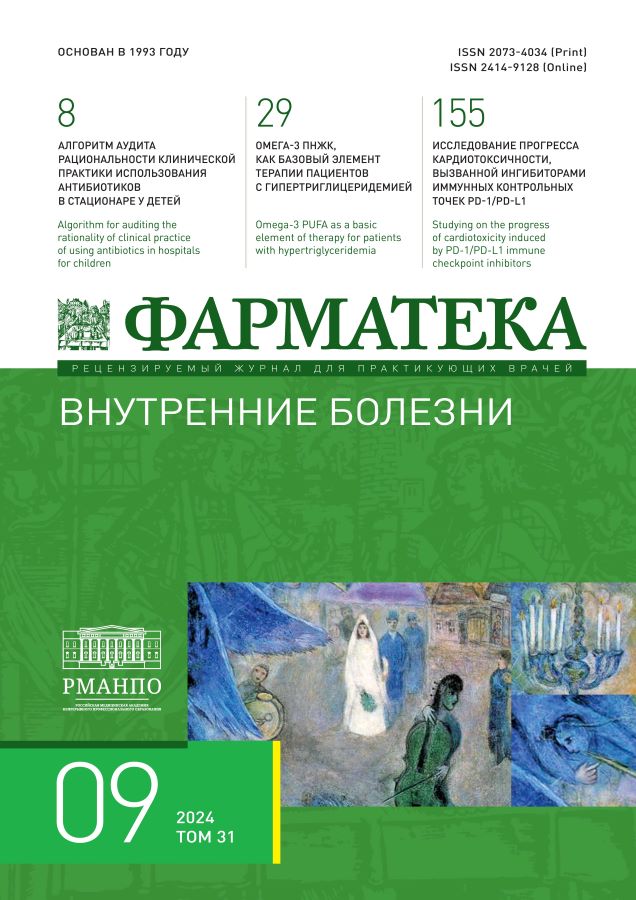Development of an algorithm for predicting the risk of cough development during enalapril therapy in patients with arterial hypertension
- Autores: Sychev I.V.1, Denisenko N.P.1, Lapshtaeva A.V.2, Kachanova A.A.1, Abdullaev S.P.1, Kupriyanov Y.Y.2, Goncharova L.N.2, Mirzaev K.B.1, Sychev D.A.1
-
Afiliações:
- Russian Medical Academy of Continuous Professional Education
- Ogarev Mordovia State University
- Edição: Volume 31, Nº 9 (2024)
- Páginas: 150-154
- Seção: Коморбидность
- URL: https://journals.eco-vector.com/2073-4034/article/view/680155
- DOI: https://doi.org/10.18565/pharmateca.2024.9.150-154
- ID: 680155
Citar
Texto integral
Resumo
Background. Angiotensin-converting enzyme inhibitors (ACE inhibitors), in particular enalapril, have retained a leading role in the treatment of arterial hypertension (AH) over the past decades, but at the same time have a side effect in the form of cough, which is one of the main reasons for a significant decrease in the quality of life of patients and subsequent drug withdrawal. An important clinical task is to create an algorithm for predicting the risk of cough development for personalizing enalapril therapy.
Objective. Creation of an algorithm for predicting the risk of cough development while taking enalapril for personalizing ACE inhibitor therapy in hypertensive patients.
Methods. To create an algorithm for predicting the risk of cough development while taking enalapril, multivariate modeling was performed using the logistic regression method.
Results. During the multivariate logistic regression analysis, genetic factors were selected in the form of rs2306283 SLCO1B1, rs495828 ABO, rs8176746 ABO gene polymorphisms, as well as data on the presence of allergic diseases and manifestations in close relatives, which together formed a model for predicting the risk of cough development while taking enalapril in hypertensive patients.
Conclusion. The presented model demonstrates high prognostic significance, has sufficient information content (R2=0.31) and allows to predict the development of cough while taking enalapril with an accuracy of 76.5%.
Palavras-chave
Texto integral
Sobre autores
I. Sychev
Russian Medical Academy of Continuous Professional Education
Autor responsável pela correspondência
Email: sychev_iv@bk.ru
ORCID ID: 0000-0003-0227-2651
Código SPIN: 5162-3779
Junior Researcher, Research Institute of Molecular and Personalized Medicine
Rússia, MoscowN. Denisenko
Russian Medical Academy of Continuous Professional Education
Email: sychev_iv@bk.ru
ORCID ID: 0000-0003-3278-5941
Código SPIN: 5883-6249
Rússia, Moscow
A. Lapshtaeva
Ogarev Mordovia State University
Email: sychev_iv@bk.ru
ORCID ID: 0000-0003-4828-2476
Código SPIN: 9138-6257
Rússia, Saransk
A. Kachanova
Russian Medical Academy of Continuous Professional Education
Email: sychev_iv@bk.ru
ORCID ID: 0000-0003-3194-4410
Código SPIN: 1214-8156
Rússia, Moscow
Sh. Abdullaev
Russian Medical Academy of Continuous Professional Education
Email: sychev_iv@bk.ru
ORCID ID: 0000-0001-9001-1499
Código SPIN: 1727-2158
Rússia, Moscow
Yu. Kupriyanov
Ogarev Mordovia State University
Email: sychev_iv@bk.ru
ORCID ID: 0000-0002-4993-5515
Código SPIN: 7488-1830
Rússia, Saransk
L. Goncharova
Ogarev Mordovia State University
Email: sychev_iv@bk.ru
ORCID ID: 0000-0002-4324-9071
Código SPIN: 5684-9502
Rússia, Saransk
K. Mirzaev
Russian Medical Academy of Continuous Professional Education
Email: sychev_iv@bk.ru
ORCID ID: 0000-0002-9307-4994
Código SPIN: 8308-7599
Rússia, Moscow
D. Sychev
Russian Medical Academy of Continuous Professional Education
Email: sychev_iv@bk.ru
ORCID ID: 0000-0002-4496-3680
Código SPIN: 4525-7556
Rússia, Moscow
Bibliografia
- Alcocer L.A., Bryce A., De Padua Brasil D., et al. The Pivotal Role of Angiotensin-Converting Enzyme Inhibitors and Angiotensin II Receptor Blockers in Hypertension Management and Cardiovascular and Renal Protection: A Critical Appraisal and Comparison of International Guidelines. Am J Cardiovasc Drugs. 2023;23(6):663–82. doi: 10.1007/s40256-023-00605-5.
- Brugts J. Discontinuation of Angiotensin Converting Enzyme Inhibitors due to Dry Cough: Incidence and Clinical Determinants. Clin Pharmacol Ther. 2019;105(3):563. doi: 10.1002/cpt.1130.
- Vukadinovic D., Böhm M. Response to «Discontinuation of Angiotensin Converting Enzyme Inhibitors Due to Dry Cough: Incidence and Clinical Determinants». Clin Pharmacol Ther. 2019;105(3):564–5. doi: 10.1002/cpt.1129.
- Стуров Н.В., Чельцов В.В., Илларионова Т.С. и др. Ингибиторы ангиотензинпревращающего фермента: неблагоприятные побочные реакции. Вестник РУДН, серия Медицина. 2004;3(27):28–33. [Sturov N.V., Cheltsov V.V., Illarionova T.S., et al. Angiotensin-converting enzyme inhibitors: adverse adverse reactions. Bulletin of PFUR, series Medicine 2004;3(27):28–33. (In Russ.)].
- Trovato D.A., Sousa J.E., Bruetman J.E., et al. Fracturas costales simetricas asociadas a tos [Symmetrical rib fractures associated with chronic cough. Report of one case]. Rev Med Chil. 2018;146(3):391–3. doi: 10.4067/s0034-98872018000300391.
- Tebha S.S., Zaidi Z.A., Sethar S., et al. Angiotensin converting enzyme inhibitor associated spontaneous herniation of liver mimicking a pleural mass: A case report. World J Hepatol. 2022;14(4):854–9. doi: 10.4254/wjh.v14.i4.854.
- Lee Y.J., Chiang Y.F., Tsai J.C. Severe nonproductive cough and cough-induced stress urinary incontinence in diabetic postmenopausal women treated with ACE inhibitor. Diab Care. 2000:23(3):427–8. doi: 10.2337/diacare.23.3.427.
- Teklay G., Gebremedhin A., Ayalew E. Prevalence of cough among patients treated with angiotensin converting enzyme inhibitors. Int J Pharma Sci Res. 2014;5(12):992–8.
- Корнилов А.А., Глушкова Н. Особенности фармакоэпидемиологии ингибиторов ангиотензинпревращающего фермента на примере регионального фармацевтического рынка. Мировая наука. 2021;6(51):398–401. [Kornilov A.A., Glushkova N. Features of pharmacoepidemiology of angiotensin-converting enzyme inhibitors on the example of the regional pharmaceutical market. World Sci. 2021;6(51):398–401. (In Russ.)].
- Sychev I.V., Denisenko N.P., Kachanova A.A., et al. Pharmacogenetic predictors of development of secondary to enalapril dry cough in hypertensive patients. Drug Metab Personal Ther. 2023;38(3):247–54. doi: 10.1515/dmpt-2023-0008.
- Сычев И.В., Денисенко Н.П., Качанова А.А. и др. Клинико-анамнестические предикторы развития сухого кашля у пациентов с кардиоваскулярной патологией на фоне приема эналаприла. Безопасность и риск фармакотерапии. 2023;11(2):231–40. [Sychev I.V., Denisenko N.P., Kachanova A.A., et al. Clinical Signs and Medical History as Predictors of Enalapril-Associated Dry Cough in Cardiovascular Patients. Safety Risk Pharmacother. 2023;11(2):231–40. (In Russ.)]. doi: 10.30895/2312-7821-2023-11-2-231-240.
Arquivos suplementares









